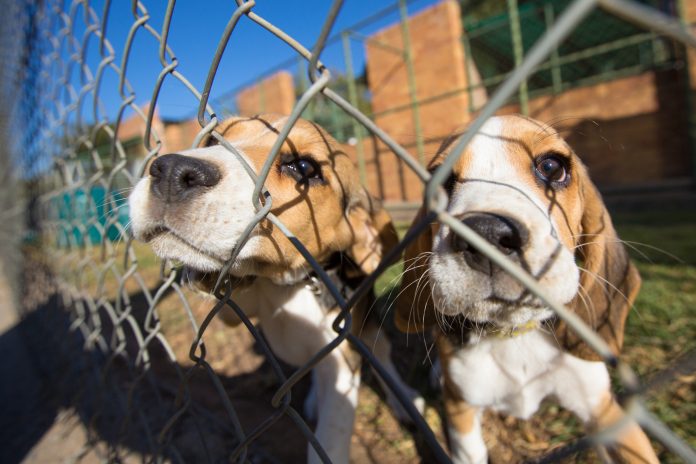New ‘Lucy’s Law’ legislation to end puppy and kitten farming will be laid in Parliament today (13 May), the Environment Secretary Michael Gove has announced
Known as ‘Lucy’s Law’, it will mean that puppies and kittens can no longer be sold by a third party seller – such as a pet shop or commercial dealer – unless they have bred the animal themselves. Instead, anyone looking to buy or adopt a puppy or kitten under six months must either deal directly with the breeder or an animal rehoming centre.
The law is named after Lucy, a Cavalier King Charles Spaniel who died in 2016 after being subjected to terrible conditions on a Welsh puppy farm. Dogs like Lucy are often kept by breeders to produce multiple litters of puppies, which are taken from their mothers at just a few weeks’ old and advertised online or sold in pet shops.
This practice causes lifelong socialisation issues for the puppy or kitten, as well as a number of preventable diseases. Today’s legislation will ensure that puppies and kittens are born and reared in a safe environment, with their mother, and sold from their place of birth.
The ban will also deter puppy smugglers who abuse the Pet Travel Scheme (PETS) by bringing underage puppies into the UK which are then sold on for financial gain.
Environment Secretary Michael Gove said:
“This is about giving our animals the best possible start in life and making sure that no other animal suffers the same fate as Lucy. It will put an end to the early separation of puppies and kittens from their mothers, as well as the terrible conditions in which some of these animals are bred.
“I would like to thank the tireless campaigners and animal lovers who have helped to bring about this positive change.
“This is all part of our plan to make this country the best place in the world for the protection and care of animals.”
Animal Welfare Minister, David Rutley said:
“The legislation laid in Parliament today is the next crucial step in stamping out the appalling trade of farmed puppies and kittens.
“As well as protecting and improving the lives of animals, it’s also about protecting the public from being tricked by unscrupulous sellers. Our ban on third party sales means that people can see first-hand that their new pet is healthy and has come from a responsible breeder.”
Marc Abraham, Lucy’s Law campaigner and founder of Pup Aid said:
“I’m absolutely thrilled that Lucy’s Law is now being laid in Parliament and will come into effect from April 2020. For years irresponsible breeders in the UK and abroad, so-called puppy farmers, have depended on commercial third party sellers – e.g. dealers and pet shops – to keep their breeding dogs and puppies in horrific conditions hidden from the public.
“Lucy’s Law is named after one of the sweetest, bravest dogs I’ve ever known, and is a fitting tribute to all the victims of the cruel third party puppy trade, both past and present.
“On behalf of my fellow grassroots campaigners I’d like to thank Mr Gove, Defra officials, and every single supporter, parliamentarian, celebrities, and ethical animal welfare organisation that has proudly helped make Lucy’s Law a reality.”
Peter Egan, Downton Abbey actor, animal welfare campaigner, and Patron of the All-Party Parliamentary Dog Advisory Welfare Group (APDAWG) in Westminster said:
“Lucy’s Law is the most exciting change in animal welfare legislation for years. Commercial third-party sellers enable and encourage irresponsible and exploitative breeding and selling practices e.g. impulse purchases and smuggled puppies, leading to widespread cruelty, sick breeding dogs and their pups, and heartache for new owners.
“Lucy’s Law will help make all breeders transparent and therefore accountable. This historic change in legislation is the first major step in tackling puppy farm cruelty and illegal puppy smuggling, whilst also providing greater public protection.
“As the proud owner of five rescue dogs, I’m extremely proud to support Lucy’s Law as it will help protect the future health and welfare of this country’s dogs and cats.”
RSPCA chief executive Chris Sherwood said:
“We’re absolutely thrilled with today’s announcement which, if properly enforced, will help protect thousands of puppies and their mothers who are the victims of this horrific trade. We believe all puppies and kittens should be born and reared in a suitable environment, with their mother, where their welfare will be the primary concern.
“Every year, the RSPCA’s officers see first-hand the devastating impact that the unscrupulous puppy trade has on dogs and their owners. Last year (2018) was the busiest year yet for our inspectors who received 4,397 complaints about the puppy trade in England alone – a 162% increase on five years ago.
“We hope this ban – alongside the tougher licensing regulations that were introduced in October – will help to stamp out the underground trade that exploits these wonderful animals simply to make a quick buck.”
Caroline Yates, CEO at Mayhew:
“Mayhew is very pleased to hear that Lucy’s Law has now been laid in Parliament. We have long supported the call to ban third-party puppy and kitten sales, and we are delighted that such legislation will come into force next year and make a difference to the lives of countless animals.
“This ban is a great step forward in improving animal welfare standards, and together with the tighter licensing laws introduced last October, will result in significantly fewer animals being bred in and passed around harmful or unsuitable environments by unscrupulous breeders and dealers.
“We hope this legislation will also encourage potential pet owners to first think about visiting their local rehoming shelters when searching for a puppy or dog, cat or kitten to adopt into their families.”
Claire Horton, Chief Executive of Battersea Dogs & Cats Home said:
“Battersea welcomes the announcement that new legislation to put a stop to puppy and kitten farming will be laid in Parliament later today.
“Each year thousands of puppies are bred in terrible conditions and then sold for large sums of money to unsuspecting members of the public. A lot of these young pups will be sickly and under-socialised, leading to high vet bills and behavioural issues that a lot of new owners are sadly not able to deal with.
“Once these new regulations are approved, owners will have far greater reassurance that their new pet is happy and healthy, whether they buy from a responsible breeder or from a rescue centre such as Battersea.”
The decision to ban commercial third-party sales was announced in December 2018 and follows years of high-profile campaigning by animal welfare organisations. It was taken following a public consultation, from which there was over 95 per cent support for a ban. Last week the Animal Welfare Minister visited the Mayhew Animal Home in North London, a charity that rehomes puppies and kittens and which supports Lucy’s Law.
The legislation will come into force on 6 April 2020, giving industry and consumers time to prepare for the change.











